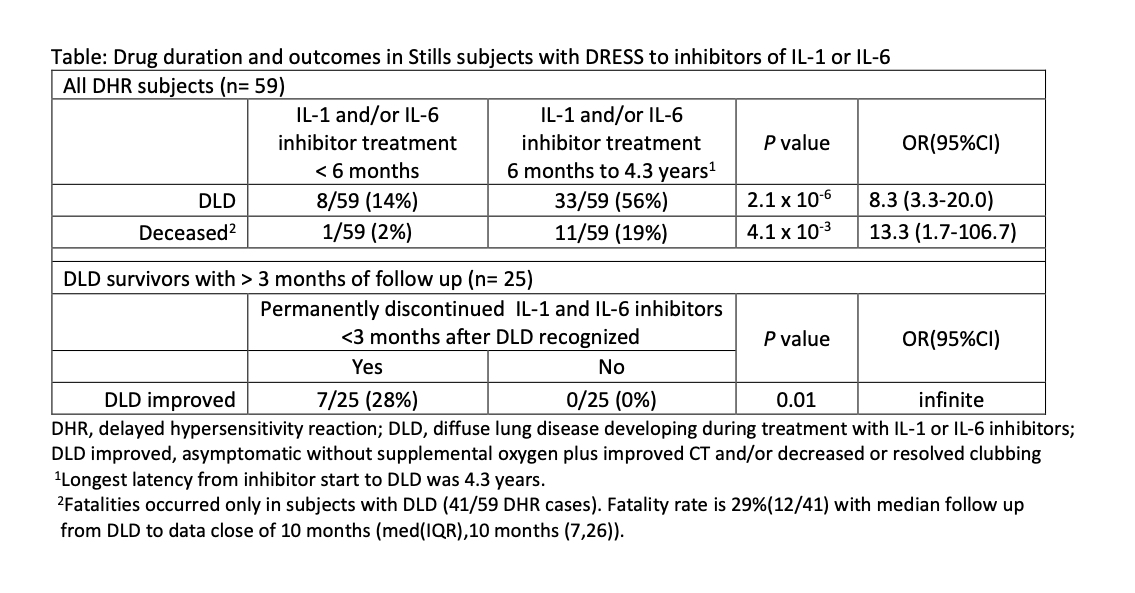Session Information
Date: Tuesday, November 9, 2021
Title: Pediatric Rheumatology – Clinical Poster III: Miscellaneous Rheumatic Disease (1614–1644)
Session Type: Poster Session D
Session Time: 8:30AM-10:30AM
Background/Purpose: Severe delayed hypersensitivity reactions (DHR) are under-recognized in inflammatory conditions, particularly drug reaction with eosinophilia and systemic symptoms (DRESS). Previous work has shown this reaction to occur implicating inhibitors of IL-1 and IL-6 during treatment of Stills disease.1 The purpose of the present analysis of newly identified cases is to assess outcomes based on timeliness of recognizing drug reaction and withdrawal of the implicated medications.
Methods: This is a retrospective observational study of subjects with Stills disease who experienced a DRESS reaction implicating one or more of anakinra, canakinumab, tocilizumab or rilonacept. Classification as DHR required scoring as probable or definite using the validated scoring system RegiSCAR for DRESS.2 Cases with and without diffuse parenchymal lung disease during treatment (DLD) were included. Variables included duration of drug exposure, development of diffuse lung disease, lung disease status at data close and death. Lung disease resolution was defined as absence of respiratory symptoms without supplemental oxygen, normal chest CT and resolution or absence of digital clubbing. DLD improvement differed from resolution by allowing improved chest CT or digital clubbing with neither worsening. Comparisons were made using Fishers exact test and odds ratios with 95% confidence intervals. 59 subjects met inclusion criteria for DHR implicating inhibitors of IL-1 and/or IL-6. Class II HLA associations were considered as available.
Results: Median age at Stills onset was 4 years (range 0.5-17.7 years), 69% (41/59) had DLD and 61% (36/59) were female. Fatalities occurred solely in subjects developing DLD (12/41,29%). Median latency from drug initiation to detection of DLD was 1.3 yrs (range 2 weeks-4.3 years). When biopsied, pathology in DLD was pulmonary alveolar proteinosis, as described.1 Three cases resolved lung disease; all 3 had permanently discontinued IL-1 and IL-6 inhibitors within 6 weeks of DLD detection. DHR subjects without DLD who stopped IL-1 or IL-6 inhibitors did not develop DLD, during median follow-up of 1 year after drug stop (range 0.2-6.5 years). Drug withdrawal improved outcomes (table). HLA-DRB1*15 was present in 31/37(84%), strikingly exceeding population frequencies.3
Conclusion: Timely recognition of DRESS reactions and withdrawal of all IL-1 and IL-6 inhibitors improve outcomes in Stills disease, lessens risk of the often fatal drug-associated lung disease and may allow resolution of DLD. Mechanisms underlying cross reactions between these structurally different drugs are not known. Determination of HLA may limit the incidence of DHR.
1. Saper et al. Emergent high fatality lung disease in systemic juvenile arthritis. Ann Rheum Dis. Dec 2019;78(12):1722-1731
2. Kardaun et al. DRESS: an original multisystem adverse drug reaction. Results from the prospective RegiSCAR study. Br J Dermatol. Nov 2013;169(5):1071-80.
3. Hollenbach et al. IL-1 and IL-6 inhibitor hypersensitivity link to common HLA-DRB1*15 alleles. https://www.medrxiv.org/content/10.1101/2020.08.10.20172338v3
To cite this abstract in AMA style:
Saper V, Prahalad S, Canna S, Abdul-Aziz R, Alvarez M, Bingham C, Bader-Meunier B, Balboni I, Berard R, Bolaria R, Boneparth A, Casey A, Cassidy E, Chang J, Cidon M, Collins K, Dickenson A, Espada G, Fishman M, Flanagan E, Hahn T, Jindal A, Kasapcopur O, Klein-Gitelman M, Klouda T, Kostik M, Lake C, Marques M, Ombrello M, Onel K, Phadke O, Ravelli A, Reinhardt A, Robinson A, Rouster-Stevens K, Saad N, Schulert G, Shenoi S, Stingl C, Sura A, Tesher M, Tibaldi J, Torok K, Tsin C, Vasquez-Canizares N, Villacis-Nunez D, Whitehead B, Wobma H, Zemel L, Mellins E. Effect of Drug Withdrawal on Interleukin-1 or Interleukin-6 Inhibitor Associated Diffuse Lung Disease [abstract]. Arthritis Rheumatol. 2021; 73 (suppl 9). https://acrabstracts.org/abstract/effect-of-drug-withdrawal-on-interleukin-1-or-interleukin-6-inhibitor-associated-diffuse-lung-disease/. Accessed .« Back to ACR Convergence 2021
ACR Meeting Abstracts - https://acrabstracts.org/abstract/effect-of-drug-withdrawal-on-interleukin-1-or-interleukin-6-inhibitor-associated-diffuse-lung-disease/

